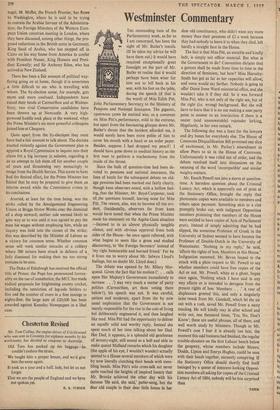Westminster Commentary
THE outstanding item of the Parliamentary week, as far as Since the bulk of question-time had been de- voted to pensions and national insurance, the lines of battle for the subsequent debate on old- age pensions had been marked out fairly clearly, though keen observers noted, with a hollow feel- ing,, that the Minister, Mr. Boyd-Carpenter, took all ,the questions himself, leaving none for Miss Pitt. The reason, alas, was to become all too evi- dent., (Incidentally, observers far from keen would have noted that when the Prime Minister made his statement on the Aqaba-Gaza situation —listened to in an almost physically tangible silence, and with obvious approval from both sides of the House—he once again referred, with what beging to seem like a gross and studied discourtesy, to 'the Foreign Secretary' instead of 'my right honourable and learned friend.' Far be it from me to worry about Mr. Selwyn Lloyd's feelings, but no doubt Mr. Lloyd does.) The debate was opened by Mr. Hilary Mar- quand. Given the fact that his motion ('. . . calls upon Her Majesty's Government immediately to increase . . .') was very much a matter of party politics (Carmarthen, art thou voting there below?), his speech was not. It was careful, patient and moderate, apart from the by now usual implication that the Government is not merely responsible for the rise in the cost of living but deliberately engineered it, and then laughed like mad. Miss Pitt had the opportunity to deliver an equally solid and worthy reply. Instead she spent much of her time talking about her Dad. Her Dad, it appears, is a splendid old gentleman of seventy-eight, still sound as a bell and able to make quaint Midland remarks which his daughter (the apple of his eye, I wouldn't wonder) actually quoted to a House several members of which were by now literally clutching their heads with trem- bling hands. Miss Pitt's solo cross-talk act never quite reached the heights of inspired lunacy that Mr. Brooke achieved the other day with his famous 'He said, she said,' patter-song, but the dear old couple in their dear little house in her dear old constituency, who didn't want any more money than their pensions of £2 a week because they had nobody to leave it to when they died, left hardly a straight face in the House.
The fact is that Miss Pitt, an amiable and kindly lady, is simply not officer material. But what is the Government to do? Convention dictates that a gesture shall be made from time to time in the direction of feminism, but how? Miss Hornsby- Smith has got as far as her capacities will allow, and ,some would say farther. Nobody is going to offer Dame Irene Ward ministerial office, and she wouldn't take it if they did. So it was forward Miss Pitt, who is not only of the right sex, but of the right (i.e. wrong) background. But she will have to learn that it is no use making a neat party point in answer to an interjection if there is a neater (and unanswerable) rejoinder lurking, Hegelianly, in her own remark.
The following day was a feast for the lawyers and dry bones for everybody else. The House of Commons Disqualification Bill promised one slice of excitement, in Mr. Parker's amendment to allow Peers to sit in the House of Commons. Unfortunately it was ruled out of order, and the debate resolved itself into discussions on the meaning of the word 'incompatible' and similar weighty matters.
Mr. Enoch Powell ran into a storm at question- time. A harmless question about the Criminal Lunacy Act, which is apparently out of print at the Stationery Office, brought the reply that photostatic copies were available to members and others upon payment. Something akin to a riot promptly broke out, with indignant Opposition members protesting that members of the House were entitled to have copies of Acts of Parliament gratis. Instead of simply admitting that he had slipped, the sometime Professor of Greek in the University of Sydney seemed to have become the Professor of Double-Dutch in the University of Westminster. 'Nothing in my reply,' he said, 'affects the rights of hon. Members in this House.' Indignation mounted; Mr. Bevan leaped to the attack with a plain request to Mr. Powell to say whether members could have free copies of the Act or not. Mr. Powell, white as a ghost, began once again, 'Nothing which I have said in any way affects or is intended to derogate from the present rights of hon. Members. . . .' A roar of displeasure greeted this, and only a singularly lame tweak from Mr. Gaitskell, which let the air out with a rush, saved Mr. Powell from a nasty mauling. He will kindly stay in after school and write out, one thousand times, 'Yes, No, Don't Know'; these are useful phrases, all of them, and well worth study by Ministers. Though in Mr. Powell's case I fear it is already too late; the moment this odd business had finished, the regular trouble-shooters on the first Labour bench below the gangway, whose members include Messrs. Dodds, Lipton and Emrys Hughes, could be seen with their heads together, earnestly conspiring. If the Stationery Office should shortly find itself besieged by a queue of innocent-looking Opposi- tion members all asking for copies of the Criminal Lunacy Act of 1884, nobody will be less surprised than
TAPER


































 Previous page
Previous page